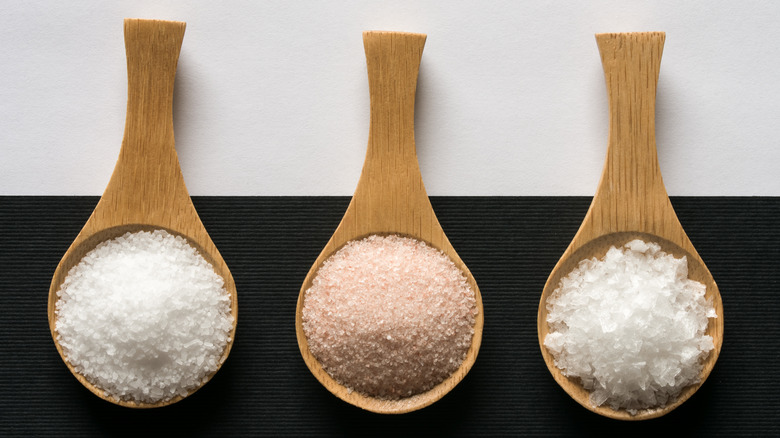Why You Absolutely Need To Salt Proteins From A Distance
If you've ever been lucky enough to watch an experienced chef prepare a steak, you may have noticed something rather flamboyant about how they season the meat before cooking. There's a very good reason why chefs sprinkle salt from a tall height, and it's not just for show; rather, this technique has everything to do with ensuring consistent flavors and textures.
Whether you're seasoning poultry, seafood, or red meat, you need to salt the protein from the correct distance to ensure even and consistent coverage across both sides. The standard rule is to do so from a height of at least a foot to make sure the particles fall evenly, minimizing the risk of clumps of salt or unseasoned patches on the food.
Salt plays a major role in improving the flavor of meat and seafood (making it that much more important to ensure the whole piece is evenly and adequately salted). When you season a steak with an even sprinkle, the salt will draw water molecules from inside the meat to the surface. and then diffuse it back into the meat, essentially enriching the steak's flavor from the outside in.
But, proper seasoning technique is not only about boosting flavor. For certain proteins, such as beef or lamb, salt tenderizes the meat as well by breaking down tough connective tissue and muscle fibers, giving you a smoother, juicier bite.
What kind of salt should you choose?
There are many different types of salt to choose from, but kosher salt is a popular choice for seasoning proteins before cooking. This is because of its coarse grain, which makes it easy to delicately pinch and sprinkle just the right amount. It also adheres well to food, dissolves and sinks into proteins easily, and has a pure and clean taste. Unlike table salt, kosher salt is also free of preservatives or any other additives.
If you want to use kosher salt to season red meat, poultry, or seafood before cooking, use ¾ to 1 teaspoon per pound. If you're using table salt, remember that it is denser and saltier to the taste than kosher salt, so cut back to ½ to ¾ teaspoons per pound.
Also, avoid using flavored or herb-infused salts before or during the cooking process, as subtle flavors may be lost. There's a reason they are often referred to as "finishing salts"! Rather, use the flavored varieties to further season proteins after cooking them so that subtle notes of rosemary or garlic have a chance to stand out.
When to salt different proteins
Red meat, poultry, and seafood are all distinctly different sources of protein, and approaches to salting them should be different, too. When it comes to red meat, the thicker the cut, the more time it should spend marinating in seasonings before cooking. However, as a general rule, it's best to salt your red meat one day in advance of cooking it to give the salt enough time to work its magic.
Doing so ahead of time also helps meat to retain moisture during the cooking process. Over time, salt breaks down protein strands into a gel that is better able to absorb and hold onto the water content that the meat releases when heated. Otherwise, the water will evaporate, and typically dry out your meat.
Poultry can be salted closer to cooking time, about 40 minutes ahead of preparing it. However, if you're cooking a large bird, such as a whole turkey, make sure you salt it about two days in advance to allow enough time to absorb in.
Seafood requires a particularly careful touch when it comes to timing and amount of seasoning. If you salt fish too early, it can become tough and chewy. To keep your seafood soft and flavorful, season a thick cut of fish cut 30 minutes before cooking, and fillets around 15 minutes before hitting the pan. For other seafood, like shrimp or scallops, salt right when you start cooking for the best results.



